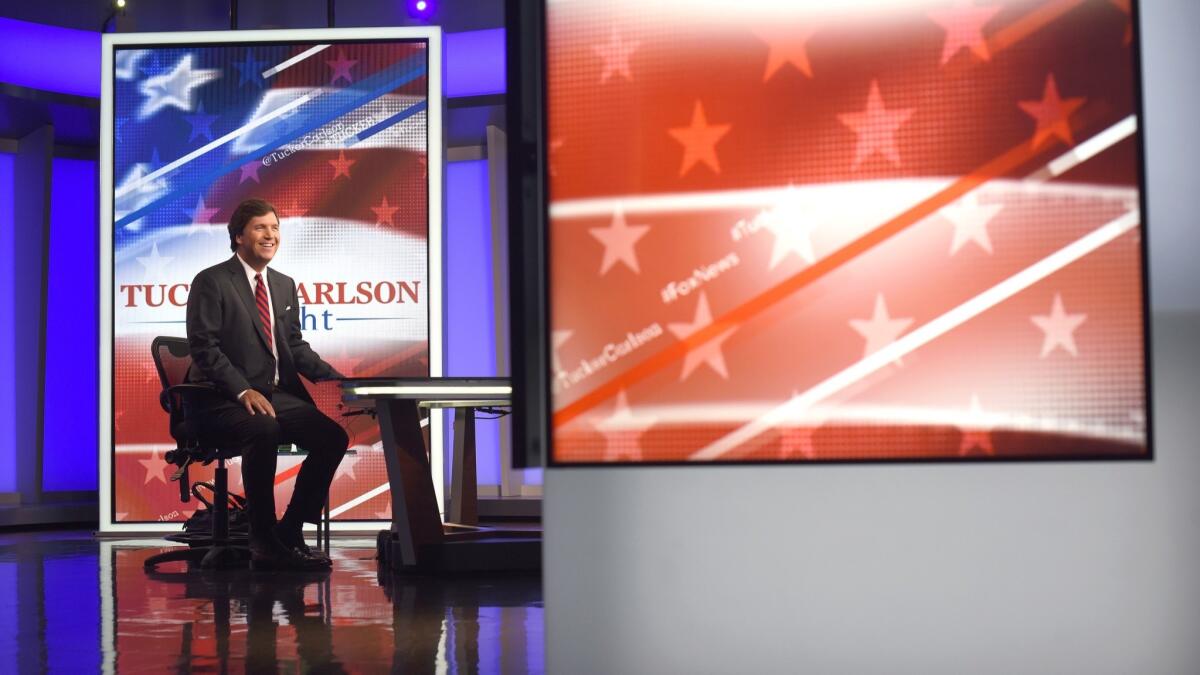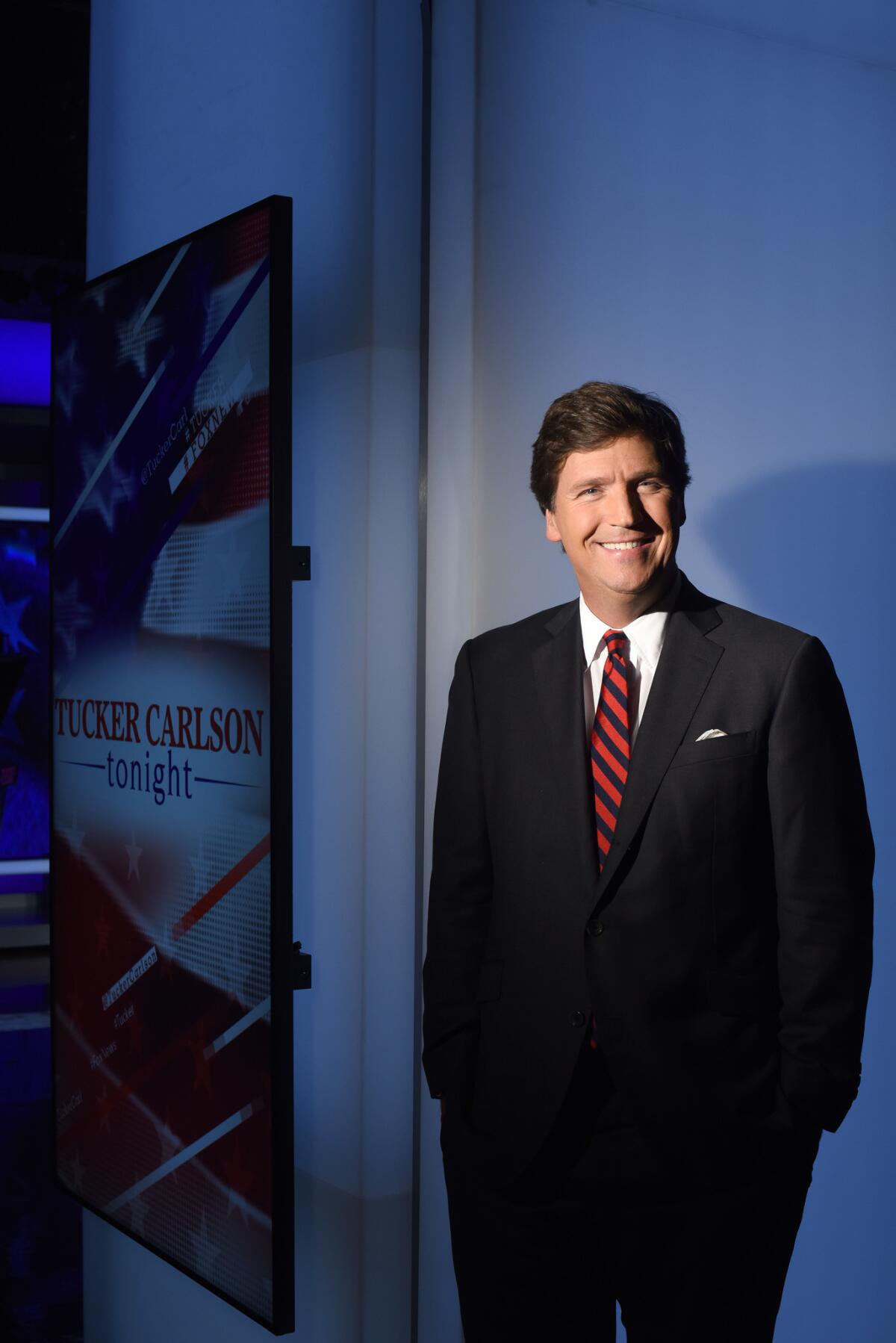In the age of Trump, Tucker Carlson’s ship has come in at Fox News

- Share via
Tucker Carlson has been a successful journalist for nearly 30 years. But in the world of cable news, he is the definition of a late bloomer.
Before his slow build to prime-time prominence on Fox News Channel, the 49-year-old conservative commentator was fired from stints at CNN and MSNBC.
There were insults along the way. Comedian Jon Stewart ridiculed Carlson on CNN’s “Crossfire,” saying his debate program was “hurting America.” One of Carlson’s network bosses told him he was too fat.
Second chances happen all the time in the TV business. Getting a third shot is rare, and Carlson has taken advantage of it. He is prospering in the heated partisan atmosphere surrounding the Trump White House, an era in which cable news audiences have demonstrated tribal allegiances to their sides.
As the Trump-friendly alternative to CNN and MSNBC, “Tucker Carlson Tonight” has ranked first among cable news audiences in its 8 p.m. Eastern time period every night since its premiere in April 2017. The program averaged 2.8 million viewers in the third quarter of 2018, according to Nielsen data, making it the third-most-watched cable news show, behind Fox News Channel’s “Hannity” and MSNBC’s “The Rachel Maddow Show.”
Advertiser demand for Carlson’s program is strong. According to Standard Media Index data, the average price for a 30-second spot is $12,363 this year, the most expensive of any prime-time cable news show. The show has taken in more than $50 million through the first eight months of 2018.
Carlson — who calls his program the “sworn enemy of lying, pomposity, smugness, and group think” — is less of a Trump defender than a true believer in the issues that energize the president’s supporters, such as stricter immigration policies, anger over political correctness, and skepticism of military intervention abroad.
The host does not always adhere to the Republican Party line. He is not a big fan of the Trump administration’s tax cuts, which he believes the Republicans in Congress used to placate their rich donors. After years of being a libertarian, he now rails more about the power of tech companies than the government.
“Who knows more about you, the Social Security Administration or Google?” Carlson said during a long conversation over a recent lunch at a Washington, D.C., restaurant near the Fox News bureau. “It’s not even close.”
Carlson expands on his nightly talking points in his new book, “Ship of Fools: How a Selfish Ruling Class Is Bringing America to the Brink of Revolution,” published by Simon & Schuster. (Another benefit of being a Fox News host is having a nightly TV platform to promote your latest tome onto the bestseller list.)
Carlson’s political bent clearly makes him a better fit at Fox News than at the previous outlets where he toiled. But he believes it was arrogance that kept him from ascending sooner as a TV host.
“I didn’t take it seriously,” Carlson said. “I had a bad attitude about TV people. I thought that they were shallow, and I thought it was really easy. I thought, ‘These people don’t read books, and they don’t understand language, and they’re not interested in history, and I’m really smart and they’re not.’ And then after failing a number of times I realized actually that I’m not that good at it, and I’m not trying that hard.”
The former La Jolla resident and son of onetime Los Angeles TV anchor Dick Carlson, Tucker Carlson established himself as a writer for the Weekly Standard, New York magazine and other publications while in his 20s and early 30s. Voluble and witty, he became a sought-after cable news talking head during the Clinton-Lewinsky sex scandal in the late 1990s.
His TV career faltered when MSNBC took a political left turn in prime time and cut him loose in 2008. It was at the height of the financial crisis, and he had no savings as his four children were in private school and approaching college age.
“I didn’t have to borrow money from anybody,” he said. “But I did wind up sweating for a number of years and thinking about what I had done wrong.”
He signed on as a contributor to Fox News in 2009, the start of a slow road back to prime time. As a weekend co-host for the network’s freewheeling morning show “Fox & Friends,” Carlson fell asleep on the air, a moment that lives in infamy on YouTube.
But Carlson had a supporter in Rupert Murdoch, the executive chairman of Fox News parent 21st Century Fox. In November 2016, he gave Carlson the daily hour held by former Fox News longtimer Greta Van Susteren. After the channel’s top-rated star, Bill O’Reilly, was fired over sexual harassment allegations, Carlson took over the high-profile 8 p.m. time period.

Whereas O’Reilly used a tough-guy tone in discussing issues as if he were sitting on a bar stool, Carlson has a more sophisticated on-air presence that reflects his time at prep schools, political journals and a Washington think tank. (He also has a thicker skin than the temperamental O’Reilly.) Nielsen data show the approach is bringing an upscale audience to Fox News. His viewers have a median annual income of $70,000, which in cable news is second only to $71,000 for Maddow’s audience.
Carlson welcomes opposing viewpoints on his program. But guests who come on the show risk being verbally smacked down by the highly caffeinated host (he drinks eight cups of coffee a day). Although Carlson is nicer than he was when his program first launched (early on he provoked Teen Vogue writer Lauren Duca into calling him a partisan hack), he won’t hide his distaste for some visitors, such as Michael Avenatti, the attorney for adult film star Stormy Daniels, who was paid by the president’s lawyer to remain silent about an alleged 2006 tryst she had with Trump.
When Avenatti accepted an offer to come on Carlson’s program Sept. 13, the host agreed not to call him a “creepy porn lawyer,” the pejorative moniker he often used when covering the Daniels story. But it turned up on the screen during their testy exchange, which led Avenatti to later call Carlson a liar on Twitter.
Carlson said he went back on his word to Avenatti because he was going for a laugh, which he admits can be a weakness on his part. “I’ve made a number of questionable decisions because I thought they were funny,” Carlson said.
The same could be said of Carlson’s recent use of a clip of the movie of Arthur Miller’s “The Crucible” when he opined on Palo Alto professor Christine Blasey Ford’s sexual assault allegations against Supreme Court nominee Brett Kavanaugh. After the clip, Carlson said he was kidding. Although he believes Kavanaugh has been treated unfairly by Democrats and other media outlets, he does not consider the investigation into the matter a witch hunt.
To some observers, Carlson epitomizes how cable news outlets are exploiting the political divide to drive up ratings.
“I do think Tucker’s getting swept up in the rhetoric sometimes,” said Rick Kaplan, a veteran news producer who hired Carlson at CNN and MSNBC and remains a fan. “There are times he says things and I just shake my head because he’s a levelheaded guy and he doesn’t always come off that way.”
Carlson does engage in productive debates, such as those with former Bill and Hillary Clinton campaign advisor Richard Goodstein, a frequent guest. Goodstein believes it’s worthwhile to reach Carlson’s large audience, even if it means serving as a foil to reinforce the views of the Fox News prime-time audience members who believe the political left is misguided and often wrong.
“I feel like I’m the Washington Generals playing the Harlem Globetrotters,” he said. “They need a second team to make it a game but it’s not on the up and up. Every time I can walk off the set and keep my dignity, I feel like I’ve done OK.”
Carlson maintains that Fox News management never dictates editorial content, and that what his viewers are seeing each night is authentic. “Falseness of any kind is too obvious,” he said. “And it destroys your soul too. I only have one show, and that’s the show I’m doing.”
Success as a cable news provocateur has its drawbacks. Since emerging as a prime-time star, Carlson frequently receives threats, requiring Fox News to provide him with security. “You can’t really go anywhere,” he said. His social circle is largely limited to family members who live in his neighborhood and share a summer home with him in Maine.
Like other Fox News commentators, Carlson has drawn the wrath of liberal watchdog groups such as Media Matters, which recently criticized his description of a land redistribution policy in South Africa as the race-based seizing of property from white farmers (prompting a tweet from Trump, an avid Fox viewer, to ask the State Department to investigate it).
The ever-facile Carlson has managed to walk the high wire of drawing viewers and attention without alienating sponsors who at times have pulled out of other Fox News programs such as “Hannity” and “The Ingraham Angle.” But he knows better than most how fragile success on television can be.
“There’s a reason that people on TV go crazy,” Carlson said. “It’s very intense.”
Twitter: @SteveBattaglio
More to Read
Inside the business of entertainment
The Wide Shot brings you news, analysis and insights on everything from streaming wars to production — and what it all means for the future.
You may occasionally receive promotional content from the Los Angeles Times.











